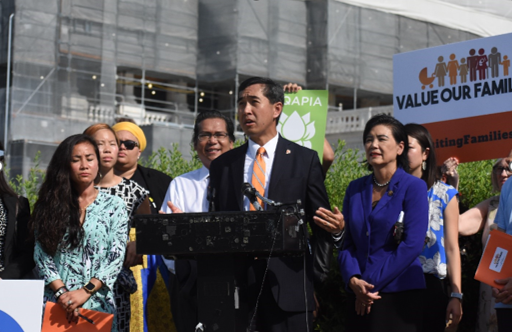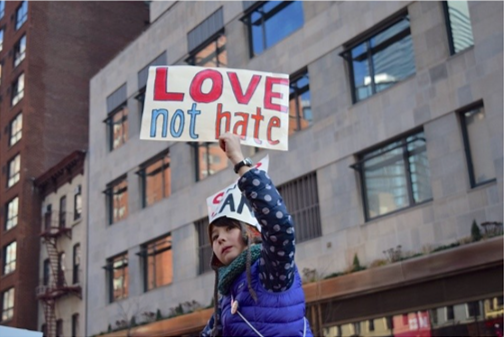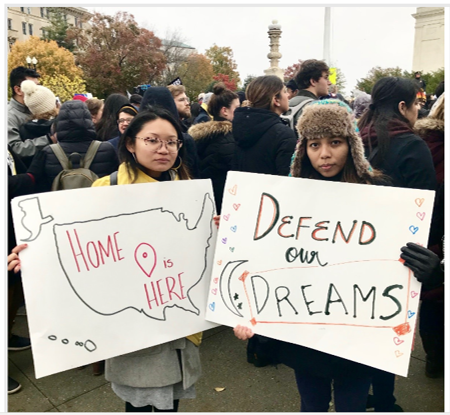Immigration and Immigrant Rights
The fastest growing racial groups in the United States are Asian Americans and Pacific Islanders (AAPI), the majority of whom are immigrants or the children of immigrants. With approximately two-thirds of Asian Americans and one-sixth of Pacific Islanders born outside of the U.S., the AAPI community also has the highest proportion of immigrants among other racial and ethnic groups.
Immigration has always been and continues to be a significant, current, and life-affecting issue for the AAPI population. As a community with a historic and significant role in shaping the United States, particularly as more immigrants enter the country from Asia than from any other region in the world, AAPI perspectives are critical to ensuring policymakers and the public have an accurate understanding of immigration issues as we work to create a system where communities thrive.

Protecting and Improving Family Immigration

Families are the cornerstone of the United States and help our country thrive. Since the Immigration and Nationality Act of 1965 (INA) ended the previous racist national origin quotas heavily favoring immigrants from Northern and Western Europe, our immigration system has prioritized family reunification and diversity. As a result, many more immigrants across racial, religious, and economic backgrounds can put down roots in the country.
Families stuck in the backlog
Reuniting families through the immigration system strengthens our communities and adds to the nation’s economy. Together, family members help their new immigrant relatives settle into their lives here. Many immigrant family members then go on to start businesses, care for those most in need, bolster our economy and become citizens. Most immigrants coming to the U.S. through the family-based system are people of color, forming the backbone of our rich, vibrant and multicultural communities.
Despite the importance of family unity as a fundamental value, the U.S. government separates families every day as a result of an outdated immigration system and visa backlogs. Nearly 4 million aspiring immigrants wait for years, even decades, for family preference visas, and nearly 40% of them are from Asia.
For years, Congress has been called on to deliver legislative solutions for immigrant families – and time and time again they have failed. While faced with many opportunities to recapture hundreds of thousands of unused family visas and fix an error in the visa allocation formula, Congress has yet to pass such reforms. Our community members and loved ones continue to bear the brunt of the government’s inaction.
Value Our Families
The Asian Americans Advancing Justice affiliation co-convened the Value Our Families campaign with partners to build public support for an immigration system that protects and promotes family unity and contributes to the U.S. social and economic fabric. The campaign is driven by a network of local and national community-based and advocacy organizations who champion family unity and fight against attacks on our family-based immigration system.
TAKE ACTION
-
Write, call and tweet at your elected officials to urge them to prioritize family immigration!
-
Join and stay connected with Value Our Families by following our movement on Twitter @ValueFamilies, Instagram @valuefamilies and Facebook @valueourfamilies
LEARN MORE
-
Check out the solutions put forth in Representative Judy Chu’s (D-CA) Reuniting Families Act
Immigration Enforcement

In the United States, the overwhelming majority of immigrants subjected to arrest, detention and deportation are Black, Brown and Indigenous. Among the AAPI community, Southeast Asians, including long-time residents and refugees, have been targeted in devastating immigration raids and continue to be greatly impacted by the racist enforcement regime.
For many Southeast Asian refugees, an old or minor conviction made in their youth means exile from the only country they know. After fleeing genocide and war as children, they sought refuge in the U.S., only to be resettled in poor urban areas without adequate resources. Faced with economic insecurity and over-policing, many Southeast Asian youth found themselves funneled into a school-to-deportation pipeline. Southeast Asian immigrants have been three to four times more likely to be deported for old criminal convictions compared to any other immigrant group. Today, more than 15,000 Cambodian, Laotian and Vietnamese refugees in the U.S. face threats of removal and are stuck living in fear and paralyzing limbo that ripples through their families and communities.
Harm at the border
At the southern border, refugees and asylum seekers are being denied the very right to seek safety. While many asylum seekers flee from other countries in the Americas, people seeking safety at the border come from all corners of the globe. An increasing number of asylum seekers and migrants from India, China and the Philippines have been apprehended by U.S. border officials.
Over the years, the U.S. has implemented a series of discriminatory policies to criminalize, punish and stop people from seeking safety here. As a result of just one of them – the misuse of the Title 42 public health authority – hundreds of thousands of people at the border have been expelled and deported back to danger, with over 13,000 reports of murder, kidnapping, rape, torture and other violence attacks against those sent to Mexico.
Behind bars and under digital surveillance
In jails and facilities across the country, the U.S. detains tens of thousands of asylum seekers, along with lawful permanent residents, family members of U.S. citizens and other longtime community members who have been pulled out of their homes. Detention creates significant burdens for them in their pursuit of asylum or relief from deportation to stay in the U.S. They spend up to months and even years in detention, often without access to legal counsel for their immigration cases and in unsafe and abusive, sometimes even deadly, conditions.
Harmful and invasive new methods and technologies – such as ankle bracelets, geolocation tracking tools, and the monitoring of social media accounts of immigrants and nonimmigrants seeking to enter the U.S. – are also used as so-called “alternatives” to detention and for immigration vetting purposes. These practices raise further concerns around surveillance and privacy, online expression, and the negative impact on our communities.
Stop funding hate
For too long, Congress has funded this bloated, unnecessary, and inhumane immigration enforcement regime, contributing to the mass incarceration of immigrants and separation of millions of families. Advancing Justice | AAJC is a member of the Defund Hate campaign and works to educate Congress and the public about the need to defund immigration enforcement agents, detention beds and harmful border policies.
LEARN MORE
-
Find out how the New Way Forward Act would reform cruel immigration laws and restore dignity to our communities
-
Read our blog post featuring the stories of Southeast Asian American impacted by detention and their advocacy for change
-
See our written statement to the House Judiciary’s Subcommittee on Immigration and Citizenship for more information on the expansion and inhumane use of detention centers
-
See the testimony we submitted to the Senate Committee on the Judiciary regarding incarceration and detention during COVID-19

Approximately 11 million immigrants living and working in the United States, including 1.7 million Asian immigrants, are undocumented. They are an integral part of our society as family members, friends, and neighbors seeking to build the American dream. Because of their status, they face barriers to accessing work, education, housing, healthcare, and other basic needs. Many also experience discrimination and live under the constant fear of being uprooted from their homes and deported. Advancing Justice | AAJC calls for a path to citizenship for our undocumented community members. Having a permanent underclass is antithetical to the democratic ideals enshrined in our U.S. Constitution.
Protect undocumented youth
For over ten years, the Deferred Action for Childhood Arrivals (DACA) program has transformed lives by providing undocumented youth temporary status and work authorization, enabling them to contribute to their communities and to the country without fear. But DACA is dying a slow death in the courts. Around 600,000 active recipients, including over 14,000 Asian Americans and 150 Pacific Islanders, stand to lose their jobs or ability to go to school and be deported from the only country they know as home. We support efforts led by directly impacted people and their organizations to protect these community members and win permanent solutions.
Temporary protected status (TPS)
TPS is a humanitarian form of immigration status that protects foreign nationals in the United States from being returned to their home country due to unsafe conditions and deportation would put them “at risk of violence, disease, or death.” Countries may be designated for TPS in cases of ongoing armed conflict, environmental disaster, or epidemic. While nationals from countries like Afghanistan, Myanmar, Nepal, Syria and Yemen, among others, are able to apply for TPS, there are ongoing campaigns for people from Pakistan and elsewhere around the world to have access to this humanitarian relief. Many TPS holders have called America home for decades and are integral members of our communities, and we support calls for Congress to pass legislation that offers TPS recipients a pathway to citizenship.
Resources
Please visit Asian Americans Advancing Justice – Southern California’s website for a list of Know Your Rights resources in English and multiple Asian languages.
